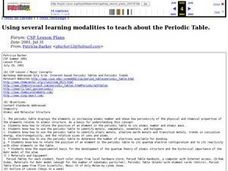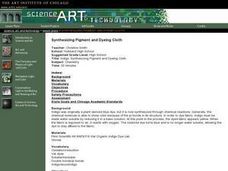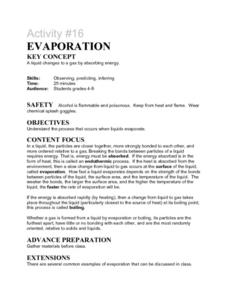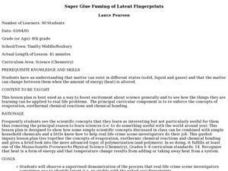Curated OER
The Connection Between Pigment and Light Colors
Young scholars explain the mole concept and use this concept to prepare chemical solutions of particular molarities.
Curated OER
Using several learning modalities to teach about the Periodic Table.
Students identify how to relate the position of an element in the periodic table to its atomic number and atomic mass. They identify how to use the periodic table to identify metals, semimetals, nonmetals, and halogens, and also,...
Virginia Department of Education
Solution Concentrations
What happens when you combine 6.022 times 10 to the 23 piles of dirt into one? You make a mountain out of a mole hill. Scholars use dehydration to obtain percent composition and then calculate the molarity of the original solution.
Virginia Department of Education
Soap, Slime, and Creative Chromatography
Do you think chromatography paper suffers from separation anxiety? Young chemists make soap, slime, silly putty, and experiment with chromatography in this instructional activity. The material includes clear instructions for each...
Virginia Department of Education
Aspirin Analysis
Laughter may be the best medicine, but aspirin is also important. Young chemists analyze aspirin tablets using titration in this lab experiment. They then repeat the entire experiment using a different aspirin brand.
Virginia Department of Education
Heat Transfer and Heat Capacity
It's time to increase the heat! Young chemists demonstrate heat transfer and heat capacity in an activity-packed lab, showing the transitions between solid, liquid, and gaseous phases of materials. Individuals plot data as the changes...
Curated OER
Synthesizing Pigment and Dyeing Cloth
Students create a synthetic dye and oxidize the dye and record the effects.
Cornell University
The Making of Macromolecules
Compare and contrast macromolecules made from the same elements. Young scholars learn how the structure of a molecule has as much influence on a compound as the elements in the molecule. They experiment with molecular model kits to...
Curated OER
Molecular Modeling Activity
High schoolers explore the concept of molecular modeling and differentiate between saturated and unsaturated compounds. In small groups, they identify molecular formulas, complete a chart comparing alkanes, alkenes, and alkynes, and...
Curated OER
Teaching the Scientific Method Using Adhesives
Learners research on the history of adhesives. In this science instructional activity, students select one test to use in finding the stickiness of adhesives. They collect data and formulate a conclusion.
Curated OER
The Synthesis of Some Organic Compounds And Their Representative Structures
Students examine how to represent organic compounds three-dimensionally. They write a synthesis reaction for three demonstrations, and construct a three-dimensional structure using a molecular modeling set.
Curated OER
Comparing Properties of Elements & Compounds
In this elements and compounds worksheet, students review the physical properties of different compounds and elements using websites for information. This worksheet has 1 graphic organizer and 1 short answer question.
Cornell University
Bacteria Take Over and Down
Bacteria outnumber all other forms of life on Earth. Scholars observe the growth of bacteria in petri dishes to understand their role in maintaining good health. Then, they observe the growth of bacteria after they introduce...
Curated OER
Evaporation of Alcohol and Water
Students investigate the process that occurs when liquids evaporaate. They test water and alcohol to determine which substance evaporates more quickly and relate the rate to energy changes.
Curated OER
Understanding of the Structure of an Amino Group
Students review the characteristics of acids and bases. They examine the structure of an amino group and compare amines to ammonia. They work together to develop the concent of polymerization.
Curated OER
Doing Lewis Dot Diagrams
Students observe the periodic table and draw the Lewis Dot Diagram. In this investigative lesson students construct information on several elements including the Lewis Dot Formation and take a quiz on the information they learned.
Curated OER
Super Glue Fuming of Latent Fingerprints
Students explore latent fingerprinting. They observe a supervised demonstration of the process that real-life crime scene investigators sometimes use to identify latent fingerprints. In addition, they brainstorm ways to improve the...
Curated OER
Properties of Matter (Biomaterial Through Nanotechnology)
Students investigate friction between different surfaces. In this physics lesson, students research biomaterials that can reduce friction. They calculate efficiency using a mathematical formula.
Curated OER
Lesson on Proteins
Students examine the importance of proteins including their function and structure. In this protein lesson students play a game to help them better understand proteins.
Curated OER
Ethical Decision Making in Biology
Students explore a model that illustrates the spread of HIV through an adolescent population. Acting in the role of epidemiologists, students explore the dilemmas of HIV infection presented by a simulation. Students produce a play, skit,...
Curated OER
EGG-cellent POLYMER PACKAGING DESIGN
Students investigate the concept of a polymer using an experimental design of protecting an egg in a bookbag. They test the properties of polymers and form an educated solution to the proposed problem. Then they describe the steps used...
Curated OER
Micro-Magic With Sticky Ions
Students view a video about the formation of precipitates. They complete a worksheet that asks them to identify what makes a compound form and what holds it together.
American Chemical Society
Middle School Chemistry: Energy Levels, Electrons, and Covalent Bonding
Students discover the concept that two atoms can attract and form a covalent bond.
American Chemical Society
Middle School Chemistry: Lesson Plans: What Is a Chemical Reaction?
After observing a demonstration of a chemical reaction between a burning candle and the oxygen in the air, students use atom model cut-outs to model the reaction and see that all the atoms in the reactants show up in the products.
























